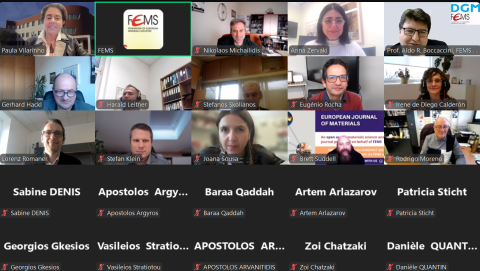- Robust and Reliable Data – Large, high-quality datasets are essential, ensuring accuracy, completeness, and transparency in AI-driven discoveries.
- Cross-Disciplinary Collaboration – Bridging different industrial sectors while balancing data confidentiality and open science is crucial.
- Computational Power & Advanced Algorithms – High-performance computing is needed to process complex materials data and accelerate simulations.
- AI for Fast Screening, but Experimentation Remains Essential – While AI can speed up synthesis and materials discovery, physical validation through experimentation and qualification remains indispensable.
News
Exploring the Role of Artificial Intelligence in Materials Science – FEMS Online Event Recap

On 29 January 2025, the Federation of European Materials Societies (FEMS) hosted an insightful online event exploring the intersection of Artificial Intelligence (AI) and Materials Science. The event was co-chaired by Prof Aldo R Boccaccini, FEMS President, and Dr Gerhard Hackl, FEMS Strategy Advisory Group (SAG) Chair. Bringing together leading experts from industry and academia, the discussion highlighted AI’s transformative potential in materials research, its challenges, and the opportunities it presents for accelerating innovation in the field. Expert Insights and Key Takeaways The panel featured distinguished speakers: – Assoc Prof Eugénio Rocha (University of Aveiro, Portugal) – Dr Irene de Diego Calderón (ArcelorMittal) – Prof Lorenz Romaner (University of Leoben, Austria) Discussions revolved around AI’s ability to enhance efficiency, reduce costs, and accelerate product development in materials science. However, the integration of AI also raises important concerns, including ethical considerations, job displacement, cybersecurity risks, and trust in AI-generated results. Key Challenges & Needs for AI in Materials Science To fully harness AI’s potential in the field, the speakers emphasized several critical needs:

